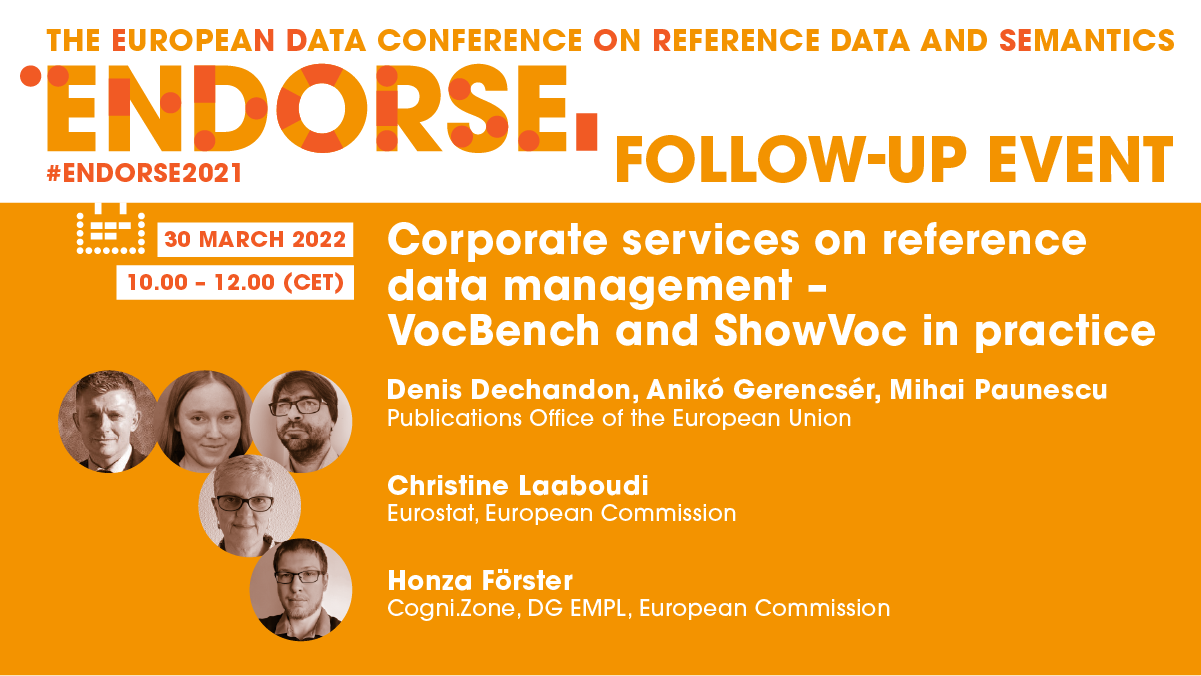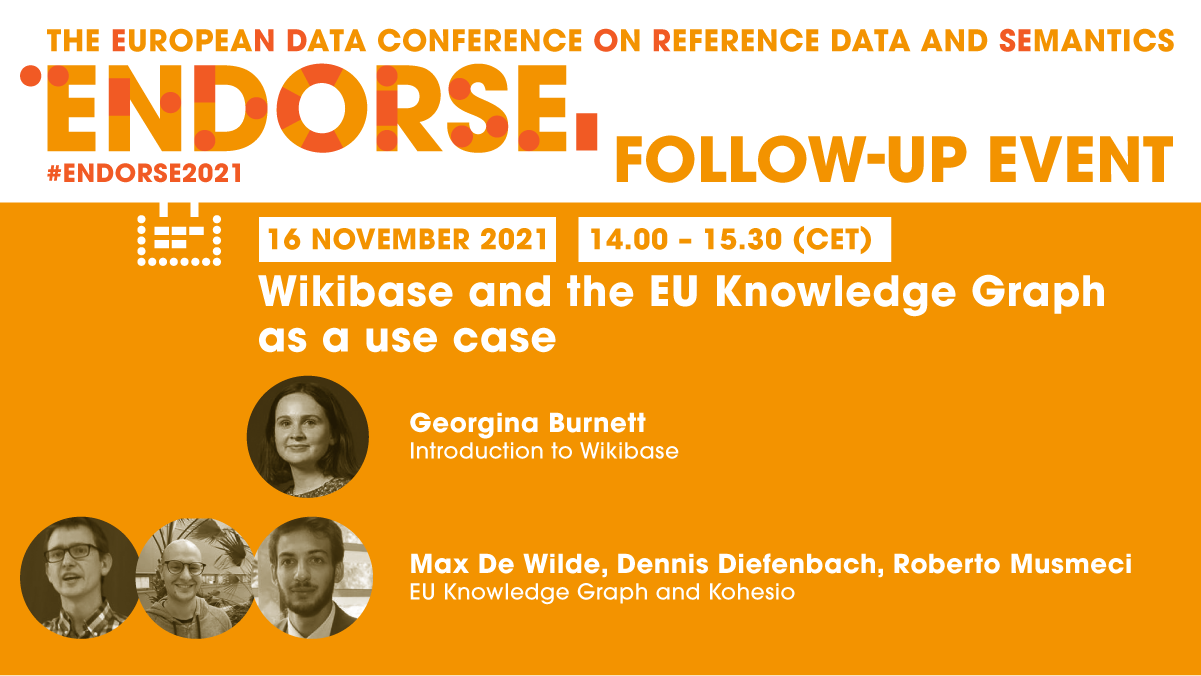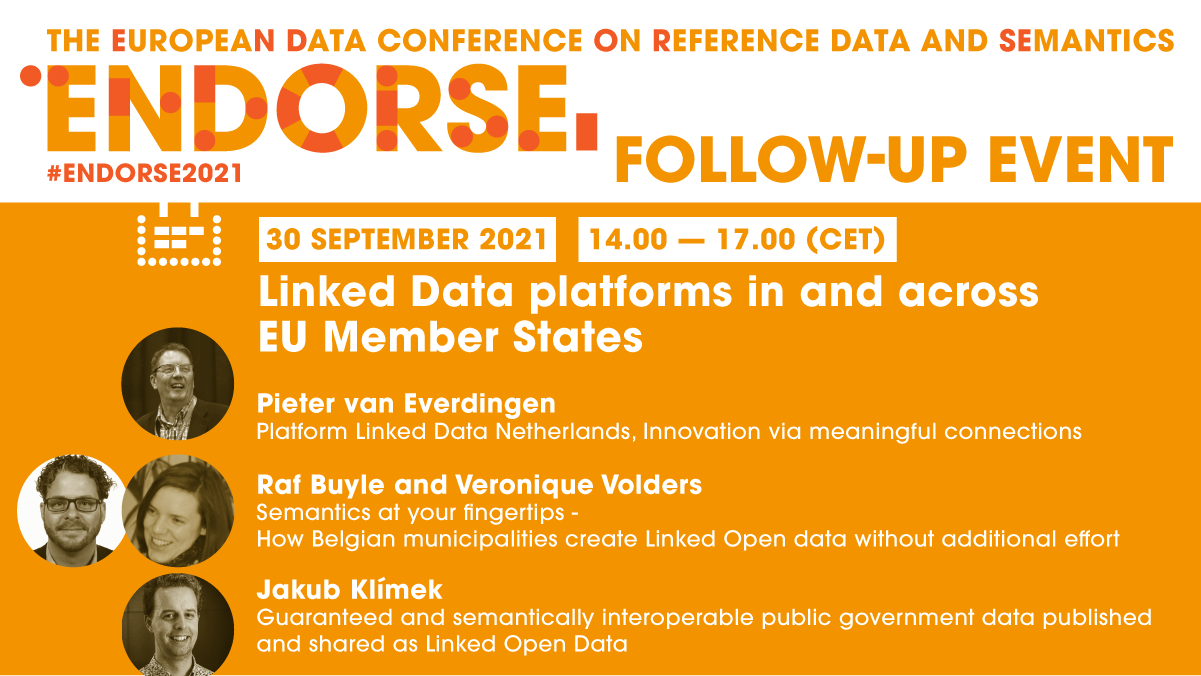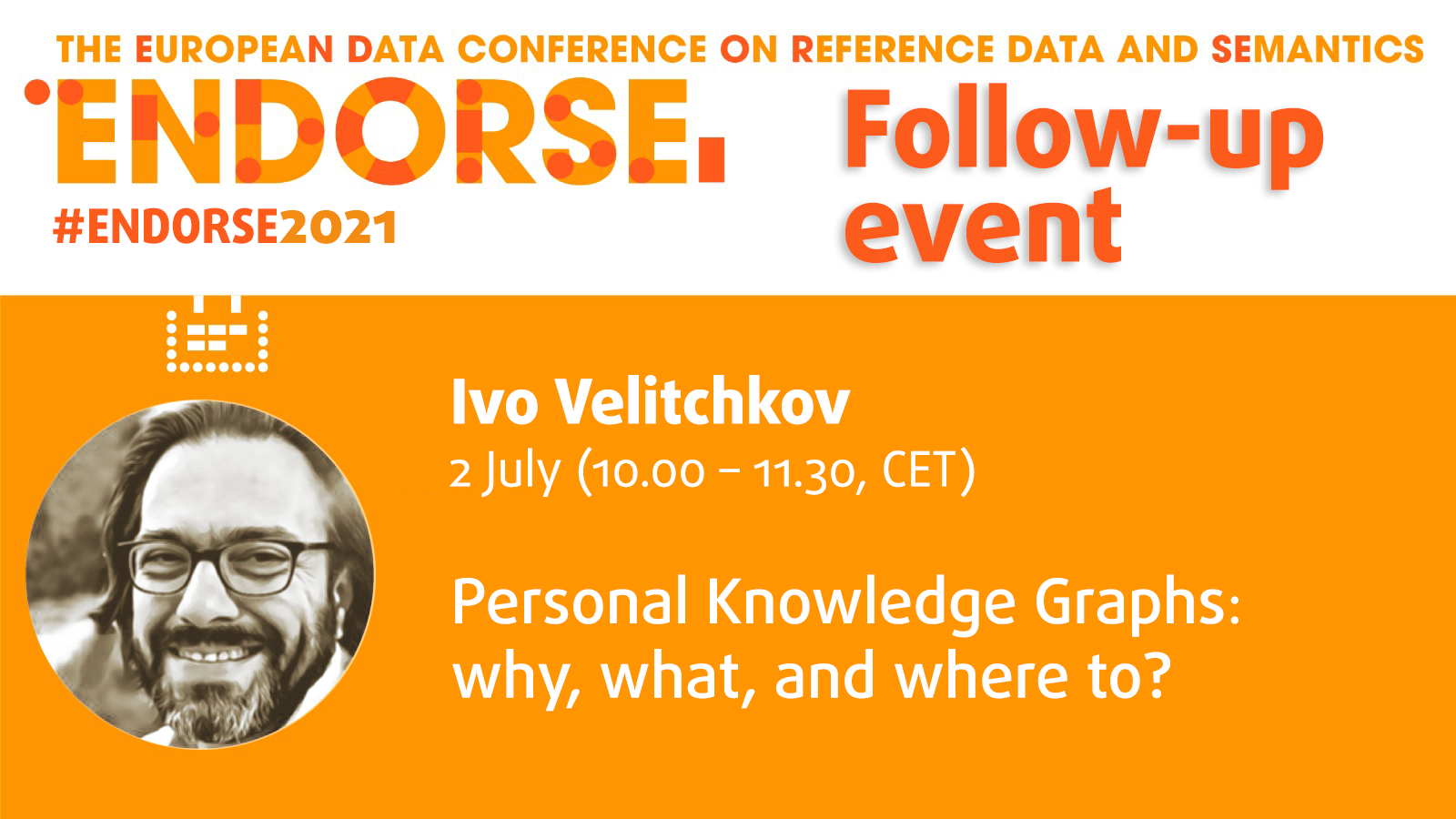Follow-up events
We are organizing a series of follow-up events of the ENDORSE conference: presentations, trainings and webinars that will occur on a quarterly basis.

The next follow-up event of ENDORSE will take place on 30 March 2022 (10.00-12.00 CET) as an online webinar on Corporate services on reference data management - VocBench and ShowVoc in practice.
Speakers:
Denis Dechandon, Anikó Gerencsér, Mihai Paunescu (Publications Office of the European Union)
Christine Laaboudi (Eurostat, European Commission)
Honza Förster (Cogni.Zone, DG EMPL, European Commission)
The recording is available here.
The slides are available:
Corporate services on reference data management
Join via Webex: https://ecconf.webex.com/ecconf/j.php?MTID=m1986e9c045d90bb85beb4dd83622abfd
Join by meeting number:
Meeting number (access code): 2742 661 2909
Meeting password: HzrsKKM@424 (49775561 from phones)
Abstract:
In the era of semantic technologies, it is necessary not only to create, update and maintain metadata and reference data, but also to effectively share, visualise and align this data, so as to enhance interoperability. This requires specialised knowledge and established validation procedures, as well as the proper tools and adapted dissemination chains.
The Publications Office of the European Union provides corporate reference data management services for the DGs of the European Commission and similar to other interested stakeholders (EU institutions, agencies and national public administrations). The services focus not only on supporting users in reference data related requests and questions, but also on easing the use of semantic technologies and standards, and supporting the creation and maintenance of reference data and on the other hand on providing the necessary infrastructure (tools and platforms) for maintaining and for disseminating reference data.
In this context a corporate access is offered to all requesting EU institutions, agencies and national public administrations to two semantic applications: VocBench and ShowVoc.
VocBench is a web-based, multilingual, collaborative development platform for managing ontologies, thesauri, lexicons, generic code lists and authority lists. Designed to meet the needs of semantic web and linked data environments, VocBench development has also been driven by the feedback gathered from a community of users made of public organizations, companies and independent users looking for open source solutions for maintaining their reference data and other controlled vocabularies.
On the other hand, ShowVoc is a web-based, multilingual, platform for publishing, browsing and inspecting the same controlled vocabularies as listed above. It further entails cross-dataset features, such as global search and a translation API benefit from the presence of different datasets in order to realize a multilingual resource for term reference and authoritative term translation.
ShowVoc naturally complements VocBench. Initially funded by the European Commission ISA² programme and currently by the Digital Europe Programme (DIGITAL), the development of both applications is managed by the Publications Office of the EU. VocBench and ShowVoc are open source solutions that can be reused and further improved by any interested professionals, while the EU national public administrations maintaining vocabularies in the scope of Legivoc can benefit from a free access to the VocBench and ShowVoc corporate instances made available by the Publications Office.
Additionally, a new tool is being conceived. Currently called “Semantics Elicitation Platform”, it is intended to be used independently or as a companion to VocBench, processing and managing unstructured information (e.g. text, various kind of media) and eliciting knowledge out of it, in the form of structured information modelled according to target ontology vocabularies. The project aims at realising an open environment for automatic sharing and provision of text-engineering components based on the same principles of Linked Open Data (a text mining platform).
The webinar will start with the presentation of the corporate reference data management services offered by the Publications Office, followed by two showcases presented by users from the European Commission (DG ESTAT and DG EMPL) who will speak about their experience of using VocBench and ShowVoc in practice. The third part of the event will provide a short demo of both tools and give the opportunity to participants to ask questions.

The next follow-up event of ENDORSE will take place on 16 November 14.00-15.30 (CET): Wikibase and the EU Knowledge Graph as a use case.
The speakers will be:
Max De Wilde (DG CNECT, EC), Dennis Diefenbach (The QA Company), Roberto Musmeci (DG REGIO, EC) and Georgina Burnett (WMDE)
The video is available here.
The slides are available:
Join via Webex: https://ecconf.webex.com/ecconf/j.php?MTID=mfbabe8821779676dff49ca61b4b63c4d
Join by meeting number
Meeting number (access code): 2740 009 7577
Meeting password: ZKdR4PAh?54 (95374724 from phones)
Abstract:
Wikibase is a free, open source software developed and maintained by Wikimedia Deutschland. Originally developed to run the free knowledge base Wikidata, Wikibase is available as a flexible and collaborative software solution that allows users to set up and maintain their own linked database.
The EU Knowledge Graph, available at https://knowledgegraph.eu, is using Wikibase as the underlying infrastructure. Wikibase enables multilingual, collaborative, user friendly and open access to the EU Knowledge Graph which is collecting and integrating structured information related to the European Union.
The largest part of the graph is represented by projects financed by the European Union Cohesion funds. This data is exposed to citizens in Kohesio available at https://kohesio.eu.
In this session, we will give an introduction to Wikibase and present the EU Knowledge graph as a use case.

Follow-up event: Linked Data platforms in and across EU Member States
The video is available here
Pieter van Everdingen: Platform Linked Data Netherlands, Innovation via meaningful connections
Platform Linked Data Netherlands (PLDN) is an open network community of linked data experts in the Netherlands, who would like to share their knowledge and experiences from the linked data projects they are involved in with everyone who has an interest in linked data and those that would like to get started with their own linked data activities. It has developed into a vibrant community with several hundred active members and a few thousand interested parties.
PLDN activities concentrate around organising networking events, facilitating activities for working groups and releasing publications on linked data topics, like the Gems of Linked Data Applications book (available in Dutch), which contains successful examples of linked data initiatives from our PLDN network that we would like to share with a larger audience. We are also very proud of a very different deliverable that we have created: Play-LOD, which is a card board game that can be used to explain the basic concepts of linked data in an easy to understand and playful way. And to make community members more hands-on with linked data, we stimulate them to experiment with linked data via our free to use PLDN lab environment for which we also organised a number of introduction courses. And we work with organisations in our network to start up new activities and new promising linked data initiatives that can possibly be financed or co-financed from innovation budgets and grants within the EU and the Netherlands. PLDN is completely open for any work co-operation that would lead to further adoption of linked data and more best practices.
The slides are available here.
Raf Buyle and Veronique Volders: Semantics at your fingertips - How Belgian municipalities create Linked Open data without additional effort
Flanders is building an open ecosystem based on Open Standards and Linked Data. There are about 300 local governments in Flanders, of which over 65% is publishing their local legislation as reusable machine-readable information.
With the use (and reuse) of templates, standards and digitalization of the legal drafting process, linked data allows to reuse more easily across local governments and other stakeholders, predict the impact of decisions before they are made and therefore take optimal decisions, while making information on legislation easily accessible and reusable to anyone.
In this session, we share how we have crossed the chasm: how we introduced our initiative to innovators and early adopters, how we onboarded the early majority. Also, we will share which new Linked Data initiatives Flanders is initiating in the context of the COVID-19 resilience.
The slides are available here.
Jakub Klímek: Guaranteed and semantically interoperable public government data published and shared as Linked Open Data
In 2021, legislation was adopted in Czechia, introducing the obligation of public administration institutions to provide their public data as open data and, more importantly, to consume the open data whenever it is necessary to access the public data of another institution. Consequently, the Ministry of the Interior of the Czech Republic (MOI-CZ) introduced the so-called Public Data Space (PDS) and is currently working on the necessary infrastructure. It will consist of public data published as open data with additional guarantees ensuring the FAIR principles. The data in PDS will be cataloged in the National Open Data Catalog, along with all the other open data. In addition, the data providers will guarantee the formal correctness and availability of the data to the other institutions. To ensure the interoperability of the shared data, formal open standards (FOSes), as defined in EU DIRECTIVE 2019/1024, will be issued by MOI-CZ for the relevant data domains. A FOS prescribes the allowed data formats and data structures. At its core, it prescribes an RDF representation adhering to the principles of Linked Open Data. Other formats, such as JSON or CSV, can also be introduced if necessary, maintaining transformability to RDF through JSON-LD and CSV on the Web. The semantic interoperability in PDS will be achieved by mapping the data structures defined in FOSes to the public administration ontology, which we call the semantic government vocabulary (SGoV). SGoV defines important domain concepts, relationships between them, semantic mappings among concepts from different domains, and also the ISA Core Vocabularies. The FOSes themselves, including data structure definitions, their expression in different data formats, transformations between the formats, mapping to SGoV, and also documentation, will be generated from SGoV semi-automatically. A set of tools for the management of SGoV will be demonstrated in the talk. We will conclude with the possibility of extending our approach to the whole EU.
The slides are available here.

The market for Personal Knowledge Management (PKM) software boomed in the last 18 months. As in many other digital areas of accelerated growth, the pandemic served as a catalyst, but the trend was evident before that. And unlike the previous generation of PKM tools, the most successful ones in this wave manage the data as knowledge graphs. Personal Knowledge Graphs (PKG) fundamentally change the way we manage our information, currently trapped in emails, documents, presentations, notebooks and social networks. Many PKG users report huge boost in both productivity and creativity.
This webinar will explore various PKG use cases from intelligent note-taking and project management to learning and research, what kind of capabilities that serve these use cases stabilize in this ecosystem and what could be the impact of PKG on collaborative knowledge management and the adoption of enterprise knowledge graphs.
It seems the role of Personal Knowledge Graphs will only grow in the coming years but the way graphs and applications interact is going to change, transforming the whole ecosystem.
You can watch its recording here.
The slides are available here.